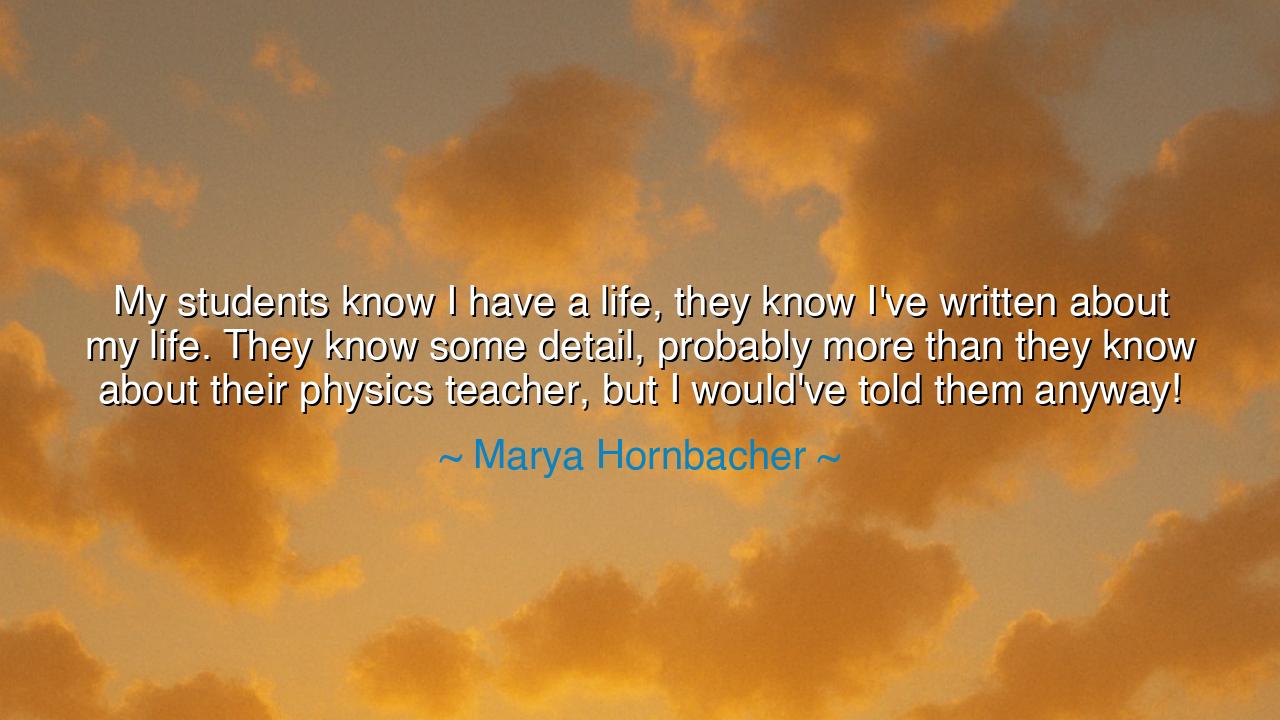
My students know I have a life, they know I've written about my
My students know I have a life, they know I've written about my life. They know some detail, probably more than they know about their physics teacher, but I would've told them anyway!






Hear the voice of Marya Hornbacher, who speaks with candor and courage: “My students know I have a life, they know I've written about my life. They know some detail, probably more than they know about their physics teacher, but I would've told them anyway!” In this declaration lies the truth that a teacher is not only a vessel of knowledge, but also a human being of flesh, of memory, of triumph and pain. She reminds us that wisdom flows not from abstract facts alone, but from lived experience, shared openly with those who seek to learn.
To say “my students know I have a life” is to affirm the importance of authenticity. Too often teachers are cloaked in the armor of authority, keeping their humanity hidden, as if to admit to struggle or imperfection is to weaken their power. But Hornbacher understood that teaching is more than the transmission of lessons—it is the transmission of humanity itself. By revealing herself, she did not diminish her students’ respect, but deepened their trust. For when a teacher shows their life, the student learns not only from books but from the living story of another soul.
Consider the great Socrates, who did not hide behind walls of academia but lived his philosophy openly in the streets of Athens. His dialogues were not cold exercises but conversations infused with his own convictions, doubts, and struggles. In this way, his students came to know not merely a theory, but a man—a life lived in pursuit of truth. Hornbacher’s openness reflects the same principle: that true education emerges when teacher and student meet as human beings, each carrying a story.
Her mention that she has “written about my life” is of great importance. To write is to leave a trace of one’s being, to make one’s struggles and insights part of the common treasury of wisdom. Her students, by knowing her writings, do not simply hear her lectures; they hear the echo of her own soul wrestling with life. In this way, the classroom becomes not a sterile chamber of facts, but a living sanctuary of truth, where knowledge is joined to experience, and experience becomes the seed of compassion.
History offers us another mirror in Helen Keller, who taught the world not only through intellect, but through the sheer fact of her life. Her teacher, Anne Sullivan, did not hide the struggle but made it central, showing students and society alike that learning is forged in fire. So too Hornbacher demonstrates that to reveal oneself—one’s trials, one’s history—is itself an act of teaching. Life itself becomes the lesson, and the teacher, by sharing it, enlarges the horizon of her students.
The deeper meaning of this quote is that vulnerability is power. When a teacher admits to having a life, when they open their story, they give their students permission to be human as well—to fail, to hope, to rise again. This is a form of mentoring far greater than formulas or grammar; it is the passing down of resilience, of authenticity, of courage to live truthfully.
The lesson for us is clear: in whatever role we teach—whether as parents, mentors, friends, or guides—we must not fear to reveal our humanity. Share your story, your struggles, your victories. Do not think it weakness to let others know that you have lived. For it is in these revelations that trust is born, and in trust, learning flourishes.
So I say to you: remember Marya Hornbacher’s words. “My students know I have a life.” Let them remind you that teaching is not the hiding of the self, but the offering of the self. Be open, be true, and let your life itself become a book from which others may read. For in this way, your influence will outlast the lesson plan and live on in the hearts of those you have touched.






AAdministratorAdministrator
Welcome, honored guests. Please leave a comment, we will respond soon